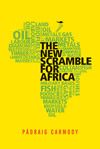Introducing Pádraig Carmody
 Pádraig Carmody is an associate professor of development geography at Trinity College Dublin.
Pádraig Carmody is an associate professor of development geography at Trinity College Dublin.
He undertook his bachelor’s and master’s degrees at thsi university, while his PhD is from the University of Minnesota, USA. At TCD, dr Carmody coordinates the TCD-UCD Master’s in development practice.
Geopolitical Passport
Your relationship with geopolitics
At what age did you discover geopolitics and what attracted you to it?
 I came relatively late and somewhat circuitously to geopolitics.
I came relatively late and somewhat circuitously to geopolitics.
I trained as an economic and development geographer at the University of Minnesota, but while I was there I also took a number of courses on African Politics and International Organizations.
I guess when I started out I had the idea that the developing world could industrialize along the lines of Europe and US, and that was my motivation; as I saw it to help that project. While some countries have been able to pursue that path, many are blocked by global power structures and resource constraints, so the issue of power and its global maldistribution became of more interest to me in the last number of years.
Which geopolitical topics have your focus and why did you choose especially these?
I am particularly interested in the role which Africa plays in global geopolitics, the role which geopolitics plays in African development and the new interregionalism being forged between Africa and Asia.
I had a book come out in 2011 on the New Scramble for Africa which examines geoeconomic and political competition between new and old external powers on the continent and the strategies they deploy with varying impact and effect.
A current paper I am working on with Slava Mikaylov examines whether or not stronger economic ties between China and African countries is correlated with changed voting patterns at the United Nations. We are still doing the analysis, but at the moment it does not appear that there is a strong relationship.
This is in part because both African countries and China often vote against the United States in the UN general assembly and this has not changed. Thus China partly draws power from the US’s structural position.
Some also argue that Africa is actually stronger than China in international fora, given greater voting weight (with the arguable exceptions of the UN Security Council and International Financial Institutions). I chose to study these issues because they impact African development profoundly.
What do you consider your most important contribution to geopolitics
I’m not sure how much of a contribution I have made, but I think there are maybe two novel concepts that I have developed.
The first of these is the idea of negative autonomy; where developing country states appear autonomous from domestic social forces, but this autonomy is often the obverse of dependence on transnational ones and therefore reflective of their priorities.
Secondly is the idea of Chinese flexigemony in Africa which I have written about with Ian Taylor. Flexigemony is the idea that rather than seeking a normative socio-political transformation towards ‘free market democracies’, like the United States, China works through existing institutions and state-society formations and complexes to achieve resource and market access.
This means the Chinese government and state-owned corporations work with both authoritarian and more democratic regimes to achieve their objectives and consequently often reinforce existing power structures.
Your geopolitical preferences
What is your favourite definition of geopolitics
As I mentioned I didn’t train in geopolitics, so am a neophyte or some might say interloper in the field. I think geopolitics is the study of uneven power distribution in space and the implications and impacts of that.
Which geopolitical scientist do you admire the most
I really admire Simon Dalby’s work for its breadth, innovation and insight.
I think he has made particularly important contributions around the geopolitics of the environment.
What is your favourite geopolitical book
“Geopolitics and the Post-Colonial: Rethinking North-South Relations” by David Slater.
I like this book because of its broad geographic and historical sweep and the fact that it is very analytical, whilst also being accessible.
What is your favourite geopolitical website
Exploring Geopolitics (of course!)
The geopolitical future
In what direction(s) will geopolitical science be heading the coming decades?
This is an intriguing question.
It is a truism to say that the world is experiencing major power shifts from the West to East and South. I think this will challenge Western international relations and geopolitical theory in a number of ways.
Some, such as Shaun Breslin argue that the rise of China is really a reflection of the rise of the power of transnational corporations in the global political economy. However more work is needed to disentangle the relationship between Western TNCs, which still continue to dominate global rankings, and Southern States.
How is the power of TNCs refracted, transformed and harnessed by Southern States? I think these are questions which can only be addressed through empirical research. In turn this will require political geographers to undertake more fieldwork in varied contexts and also sometimes to have more foreign language skills than has hitherto been the case.
Which geopolitical subject has been too little in the spotlight and needs further research?
The geopolitics of state-owned corporations from the Global South. Globalisation is often thought of as being a market-led phenomenon, even if it is partially a state-conceived and facilitated process.
However, the enormous demand for natural resources which market-led growth in China and elsewhere has unleashed has dialectically led to a rise in and externalisation of the power of Southern states, as partially expressed through the growth of state-owned natural resource companies.
Approximately ten per cent of the Fortune Global 500 companies (i.e. the biggest companies in the world) are Chinese, and all are state, or partially state owned corporations. What role do these play in the emerging geopolitics? To what extent are their imperatives and agendas autonomous or coincident with their host states?
What will be the largest geopolitical challenge for the world in the 21st century?
Without doubt I think the global environment will be the key geopolitical challenge in this century.
There are three types of natural resources: source, sink and service, and all are coming under increasing strain. Different types of resources also generate different types of incentives around competition and cooperation. For example, it is would appear to be in everyone’s interest, bar arguably some companies which develop climate change mitigation technologies to arrest the depletion of global sink resources such as the atmosphere.
This is one of the reasons why there has been movement at the recent Conference of Parties in Durban to establish a legally binding climate change agreement. However, there are more complex incentives around source resources such as oil or copper, which are used in production and circulation of commodities. For example, both the US and China have a common interest in the continued exportation of Africa’s natural resources, even if there is competition and sometimes conflict around specific point resources.
Will the Chinese model of direct, state-owned natural resource supply chains be superior in a context of increasing resource scarcity or will the technological dynamism of Western corporations facilitate new sources of supply through tar sands, shale and fracking in the case of oil for example? And what will be the geopolitical implications of this?
 Pádraig Carmody is an associate professor of development geography at Trinity College Dublin.
Pádraig Carmody is an associate professor of development geography at Trinity College Dublin.
